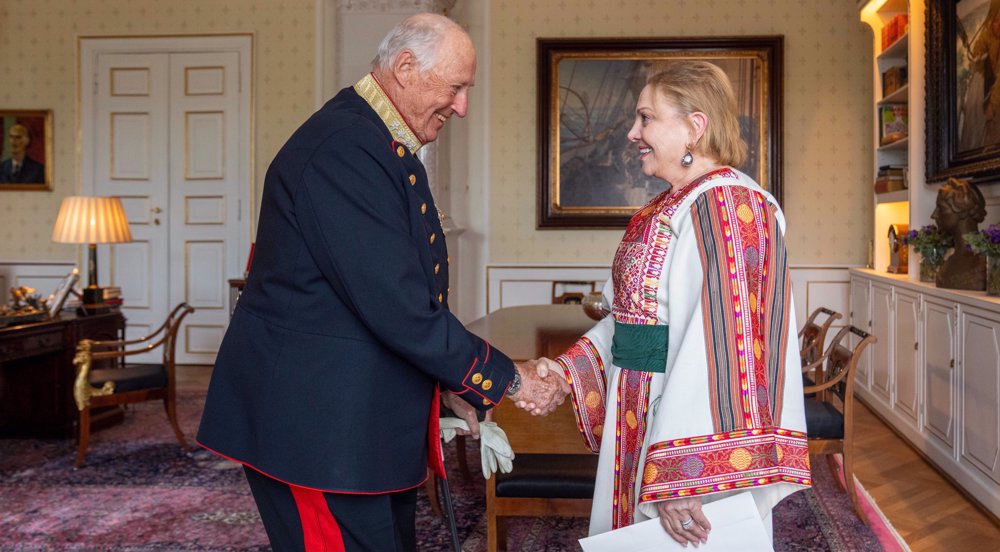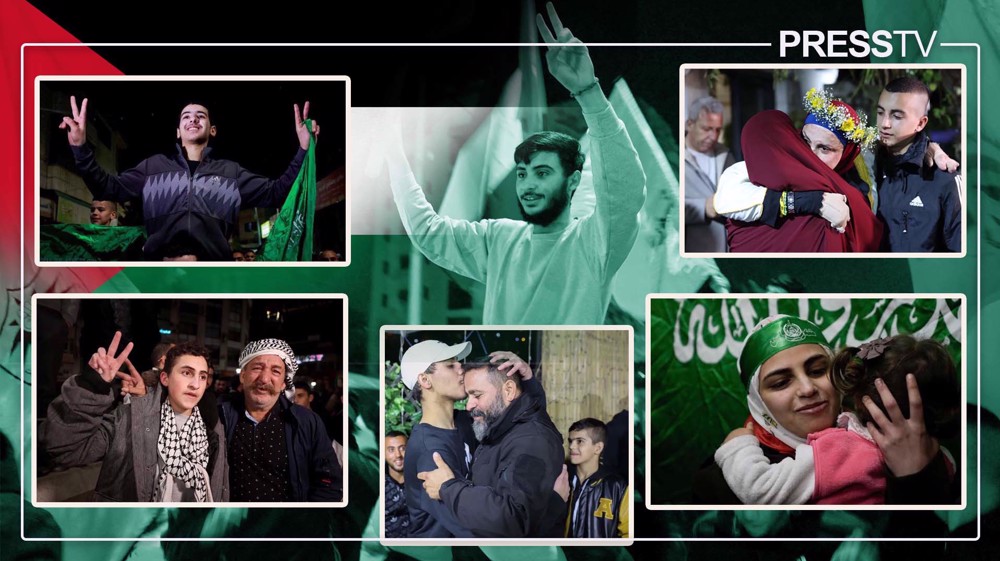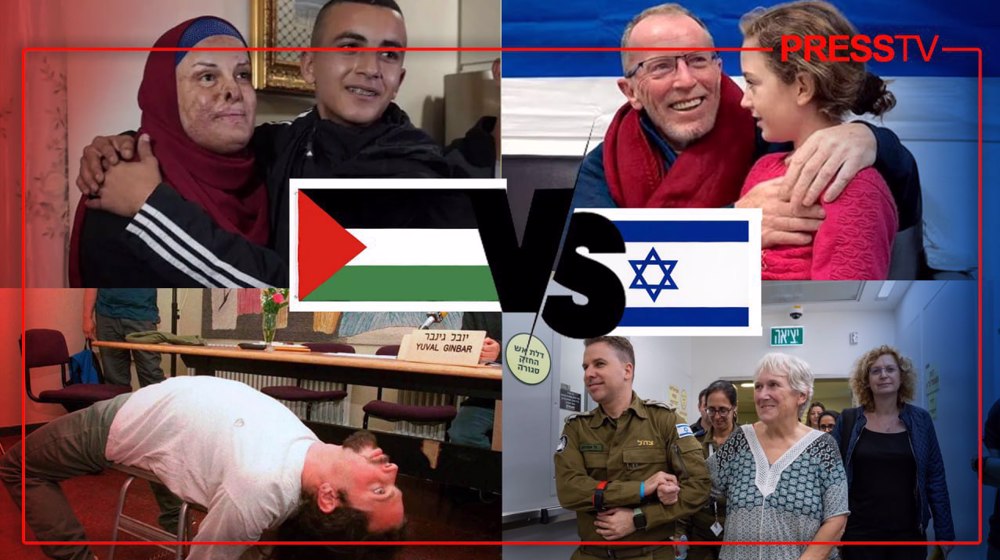Mixed feelings for Palestinians freed from Israeli jails amid death and destruction
By Maryam Qarehgozlou
Screams of joy and relief filled a room crammed with people as 23-year-old Malak Suleiman finally returned home in the occupied East al-Quds after spending six years in an Israeli prison.
Suleiman was arrested on trumped-up charges when she was a minor in 2016. Israeli police said they found a knife in her possession. The young girl was convicted and sentenced to 10 years in prison at the age of 17 on unsubstantiated charges of “attempted murder.”
She was part of the first batch of Palestinian prisoners who were released on Friday under a four-day ceasefire deal between the Israeli regime and the Palestinian resistance movement Hamas.
However, the mood was heavy as Suleiman and her family knew her freedom came after almost 15,000 Palestinian lives, most of them young children, were brutally cut short.
On October 7, Hamas carried out the multi-pronged Operation Al-Aqsa Strom, striking deep into Israeli settlements in the occupied territories, killing many Israeli soldiers and settlers and taking hundreds of others captive. The occupying regime responded with indiscriminate bombings targeting the densely-populated besieged territory, killing nearly 15,000 Palestinians.
Two-thirds of those killed in Gaza are women and children, according to Palestinian health authorities.
According to the terms of the temporary truce, 150 Palestinian women and children ought to be released from Israeli prisons in exchange for 50 Israeli captives.
Israel released 78 Palestinian prisoners, including the 39 freed on Friday and 39 freed late on Saturday.
In return, Hamas also set free 26 Israelis, 14 Thais and one Filipino captives on Friday and Saturday.
On Sunday, Israel released the third batch of 39 Palestinian prisoners and Hamas handed over 13 Israeli captives, including nine children and four foreign nationals – three Thais and one Russian.
Freed Palestinian prisoner Sara Abdullah Sweisa told Press TV that when the prisoners were informed about the prisoner exchange deal, they were happy and sad at the same time because of the martyrs in Gaza. pic.twitter.com/iO2doWLKXW
— Press TV (@PressTV) November 25, 2023
A bitter-sweet reality
“When we were informed that there was a swap deal, we were happy but sad at the same time because of the martyrs in Gaza,” freed Palestinian prisoner Sara Abdullah Sweisa told Press TV.
Sara was freed after 8 years. She, like many other Palestinian prisoners, was incarcerated on false charges. Videos of her went viral on social media platforms, prostrating in gratitude.
“My heart is broken for my brothers in Gaza, so I can’t really celebrate,” she remarked, referring to the killing of Palestinian children by the Israeli regime in its sweeping bombing campaign.
While prisoners received a heroic welcome from people in the occupied West Bank, the celebratory fervor was dampened by scenes of destruction and suffering in the Gaza Strip.
The reunion with their loved ones brought relief to prisoners and their families but they could not hide their melancholy over death and destruction that is likely to resume after the four-day truce ends.
“I am happy but my liberation came at the price of the blood of the martyrs,” said Palestinian prisoner Marah Bakeer, 24, who spent 8 years in jail on bogus charges of attempted stabbing of an Israeli soldier.
Huge crowds welcome released Palestinians in Ramallah pic.twitter.com/3or2w4AnMm
— Palestine Highlights (@PalHighlight) November 26, 2023
‘I am ashamed to celebrate’
Israa Jaabis, who was part of the second batch of Palestinian prisoners released by the Israeli regime as part of the deal brokered by Qatar and Egypt, also echoed the feelings of fellow Palestinian prisoners.
“I'm ashamed to talk about rejoicing when the whole of Palestine is wounded,” said Jaabis, who suffered an enormous ordeal in Israeli prisons during eight years of her incarceration.
Jaabis, 37, suffered third-degree burns across 65 percent of her body, including on her face and hands after her car exploded near an Israeli checkpoint in 2015, injuring an Israeli soldier.
She was charged with attempted murder, a fabricated charge she and Palestine authorities refuted.
Jaabis was sentenced to 11 years in prison. Despite her poor health condition, she was subjected to systematic medical negligence during her lengthy jail time.
“My wounds and my struggles are visible I do not need to talk about them,” she told reporters in the occupied Jerusalem Al-Quds following her release on Saturday.
Jaabis, who reunited with her son after 8 long years, said “yearning to be with the family is the price the (Palestinian) prisoners have to pay.”
She also expressed concern over the condition of other Palestinians still languishing in Israeli jails, including young girls who she said cried when she was released “because they’ve been subjected to a lot of things”.
“I’m talking about the small girls. They’ve been through things that nobody should witness,” she told the reporters at her home, flanked by her family members.
No celebrations, Israel orders
During the past few days, since the truce deal came into effect, journalists in the occupied West Bank reported that the regime authorities prevented public celebrations of the prisoners’ release.
There were also reports about Israeli forces firing volleys of tear gas at the crowds who had gathered outside the Ofer Prison to welcome freed Palestinian prisoners.
Released prisoner Marah Bakeer was also quoted as saying that her family was warned against any show of joy or celebration upon her arrival.
Her father Jawdat was taken for questioning at a police station in occupied al-Quds ahead of her release.
“Marah came home to us today. We’ve just received her but they [Israeli forces] threatened to storm the house and arrest me if we celebrate,” Jawdat was quoted as saying by Al Jazeera.
The Palestinian Prisoners’ Club NGO said on Friday that Israeli forces stormed the homes of two Palestinian prisoners who were set to be released as part of the truce deal.
“The Israeli occupation (forces) stormed the homes of two female captives, Amani Al-Hashem and Zeina Abdo, in Jerusalem [al-Quds], and warned Zeina’s family not to have any press interviews,” the club said.
“Since Friday morning, the occupations (forces) have summoned members of the families of female prisoners from Jerusalem [al-Quds] for investigation; their phones were confiscated, and they are detained until now,” it added.
The NGO also said in a statement that the Israeli regime set several conditions forbidding the freed prisoners and their families from speaking to the media, receiving guests or distributing sweets.
They were subject to a fine of 70,000 shekels ($18,740), the NGO added.
The prohibitions have been enforced at the behest of far-right Israeli minister Itamar Ben Gvir who has instructed police to shut down any celebrations for Palestinians released from Jail.
“My instructions are clear: there are to be no expressions of joy,” Gvir said before the prisoners’ release.
Ameen Abbasi, 16 years old, has reunited with his family after being released from Israeli jails as part of the prisoner swap deal between the Palestinian resistance and the Israeli regime. pic.twitter.com/t9pj3zDo9j
— Palestine Highlights (@PalHighlight) November 26, 2023
How many Palestinians are still in Israeli jails?
According to the Ramallah-based Addameer prisoners’ rights group, before the start of the war on Gaza on October 7, there were more than 5,200 Palestinians in Israeli jails, however,
Since October 3, at least 3,000 more Palestinians have been arrested in random Israeli military raids.
The number includes 2,200 administrative detainees who are held without charges or trial. The rights group says the detainees are subjected to physical violence and medical negligence in prisons.
A report published in July by Save the Children, a children’s rights organization, revealed that “the main alleged crime for these detentions is stone-throwing, which can carry a 20-year sentence in prison for Palestinian children.”
The inhumane conditions and torture methods employed against Palestinian prisoners have killed many Palestinians over the years. Since October 7, at least five Palestinians have died in Israeli jails, according to the Palestinian Prisoners' Club.
The last one to die in the Israeli jail was 33-year-old Abdul Rahman Marei from the village of Qarawa Bani Zeid, who was tortured to death in Megiddo prison in the northern occupied territories.
Press TV’s website can also be accessed at the following alternate addresses:

Gaza’s top surgeon killed under torture in Israeli jails

Norway establishes diplomatic ties with State of Palestine amid Israel's Gaza genocide






 This makes it easy to access the Press TV website
This makes it easy to access the Press TV website